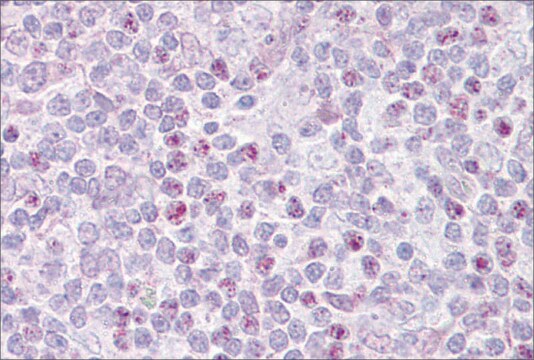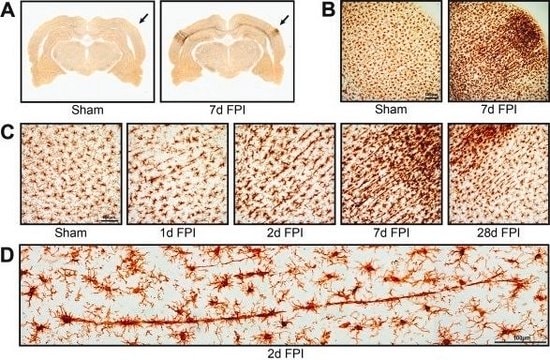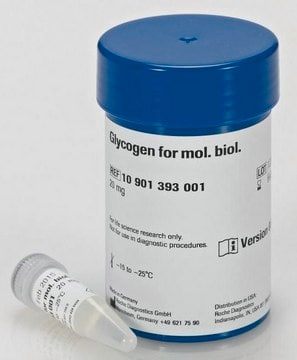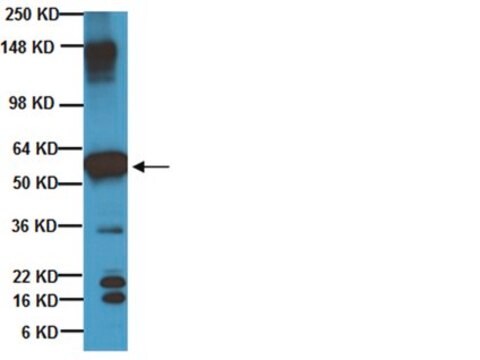추천 제품
생물학적 소스
rabbit
Quality Level
항체 형태
affinity isolated antibody
항체 생산 유형
primary antibodies
클론
polyclonal
정제법
affinity chromatography
종 반응성
human, mouse
기술
dot blot: suitable
immunofluorescence: suitable
immunohistochemistry: suitable (paraffin)
western blot: suitable
NCBI 수납 번호
UniProt 수납 번호
배송 상태
wet ice
타겟 번역 후 변형
unmodified
유전자 정보
human ... EBF1(1879)
일반 설명
The family of Early B-cell Factor (EBF) or Collier/Olf-1/EBF (COE) proteins, EBF1, EBF2, and EBF3, are ubiquitous zinc-binding transcription factors found in many species, including human, Drosophila melanogaster, and Caenorhabditis elegans. EBF1 is abundantly expressed in early B-cells, lymph node, spleen, and adipose tissue. Low levels of EBF1 have also been detected in the brain, heart, skeletal muscle, and kidney. EBF proteins are capable of forming homo- and heterodimers that bind to DNA at specific sites that include the sequence 5′-ATTCCCNNGGGAATT-3′. EBF1, the prototypical member of this family, may employ epigenetic mechanisms, such as DNA methylation and chromatin remodeling, to regulate genes involved in B-cell development such as Pax5. The second member of this family EBF2 is involved in bone development, adipogenesis, and CNS development, processes which may also hinge on EBF1. EBF3 has been characterized as a tumor suppressor protein, due to its role in regulating multiple genes such as those for cyclins and CDKs which control cell growth, differentiation, and apoptosis. However, emerging evidence indicates that all EBF proteins may play a role in the development of various cancers.
특이성
This antibody recognizes EBF-1 but not EBF-2 or EBF-3.
면역원
KLH-conjugated linear peptide corresponding to mouse EBF-1.
애플리케이션
Anti-EBF-1 Antibody is an antibody against EBF-1 for use in Western Blotting, IHC(P), Immunofluorescence, Dot Blot.
Research Category
Neuroscience
Neuroscience
Research Sub Category
Developmental Neuroscience
Developmental Neuroscience
Western Blot Analysis: 2 µg/mL from a representative lot detected EBF-1 in COS-7 cells transfected with EBF-3. (Image courtesy of Dr. Giacomo Consalez, San Raffaele Scientific Institute.)
Immunohistochemistry Analysis: A 1:500 dilution from a representative lot detected EBF-1 in mouse cryosections of wild type spinal cord tissue. (Image courtesy of Dr. Giacomo Consalez, San Raffaele Scientific Institute.)
Immunofluorescence Analysis: A 1:500 dilution from a representative lot detected EBF-1 in COS-7 cells transfected with EBF expressing plasmids. (Image courtesy of Dr. Giacomo Consalez, San Raffaele Scientific Institute.)
Dot Blot Analysis: EBF-1, EBF-2, and EBF-3 peptides from a representative lot were probed with Anti-EBF-1 (1:100 dilution). No cross reactivity to peptides for EBF-3 & EBF-2 were observed.
Immunohistochemistry Analysis: A 1:500 dilution from a representative lot detected EBF-1 in mouse cryosections of wild type spinal cord tissue. (Image courtesy of Dr. Giacomo Consalez, San Raffaele Scientific Institute.)
Immunofluorescence Analysis: A 1:500 dilution from a representative lot detected EBF-1 in COS-7 cells transfected with EBF expressing plasmids. (Image courtesy of Dr. Giacomo Consalez, San Raffaele Scientific Institute.)
Dot Blot Analysis: EBF-1, EBF-2, and EBF-3 peptides from a representative lot were probed with Anti-EBF-1 (1:100 dilution). No cross reactivity to peptides for EBF-3 & EBF-2 were observed.
품질
Evaluated by Western Blot in Raji cell lysate.
Western Blot Analysis: 2 µg/mL of this antibody detected EBF-1 in 10 µg of Raji cell lysate.
Western Blot Analysis: 2 µg/mL of this antibody detected EBF-1 in 10 µg of Raji cell lysate.
표적 설명
~66 kDa observed. Uncharacterized bands may appear between ~40 and ~170 kDa in some lysates.
물리적 형태
Affinity purified
Purified rabbit polyclonal in buffer containing 0.1 M Tris-Glycine (pH 7.4), 150 mM NaCl with 0.05% sodium azide.
저장 및 안정성
Stable for 1 year at 2-8°C from date of receipt.
분석 메모
Control
Raji cell lysate
Raji cell lysate
기타 정보
Concentration: Please refer to the Certificate of Analysis for the lot-specific concentration.
면책조항
Unless otherwise stated in our catalog or other company documentation accompanying the product(s), our products are intended for research use only and are not to be used for any other purpose, which includes but is not limited to, unauthorized commercial uses, in vitro diagnostic uses, ex vivo or in vivo therapeutic uses or any type of consumption or application to humans or animals.
적합한 제품을 찾을 수 없으신가요?
당사의 제품 선택기 도구.을(를) 시도해 보세요.
Storage Class Code
12 - Non Combustible Liquids
WGK
WGK 1
Flash Point (°F)
Not applicable
Flash Point (°C)
Not applicable
시험 성적서(COA)
제품의 로트/배치 번호를 입력하여 시험 성적서(COA)을 검색하십시오. 로트 및 배치 번호는 제품 라벨에 있는 ‘로트’ 또는 ‘배치’라는 용어 뒤에서 찾을 수 있습니다.
Xiaolei Song et al.
Neuroscience bulletin, 37(7), 985-998 (2021-05-21)
Medium spiny neurons (MSNs) in the striatum, which can be divided into D1 and D2 MSNs, originate from the lateral ganglionic eminence (LGE). Previously, we reported that Six3 is a downstream target of Sp8/Sp9 in the transcriptional regulatory cascade of
Zhenmeiyu Li et al.
Cell death discovery, 8(1), 301-301 (2022-07-01)
The striatum is the main input structure of the basal ganglia, receiving information from the cortex and the thalamus and consisting of D1- and D2- medium spiny neurons (MSNs). D1-MSNs and D2-MSNs are essential for motor control and cognitive behaviors
Agnieszka Szymula et al.
PLoS pathogens, 14(2), e1006890-e1006890 (2018-02-21)
The Epstein-Barr virus (EBV) nuclear antigen leader protein (EBNA-LP) is the first viral latency-associated protein produced after EBV infection of resting B cells. Its role in B cell transformation is poorly defined, but it has been reported to enhance gene
Andrea Tinterri et al.
The Journal of comparative neurology, 526(3), 397-411 (2017-09-19)
In mammals, thalamic axons are guided internally toward their neocortical target by corridor (Co) neurons that act as axonal guideposts. The existence of Co-like neurons in non-mammalian species, in which thalamic axons do not grow internally, raised the possibility that
Paloma Merchan-Sala et al.
The Journal of comparative neurology, 525(13), 2805-2819 (2017-05-05)
The striatum is the major component of the basal ganglia and is well known to play a key role in the control of motor function via balanced output from the indirect (iSPNs) and direct pathway striatal projection neurons (dSPNs). Little
자사의 과학자팀은 생명 과학, 재료 과학, 화학 합성, 크로마토그래피, 분석 및 기타 많은 영역을 포함한 모든 과학 분야에 경험이 있습니다..
고객지원팀으로 연락바랍니다.







